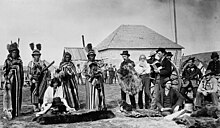Big Bear
His father, Muckitoo (otherwise known as Black Powder), was a minor chief of a tribe of 80 Plains Cree-Saulteaux people who were deemed to be "true nomadic hunters".[8] The most significant contributing factor to this was the disappearance of the bison which created a region-wide famine; in addition to this, there was the emergence and widespread epidemic of tuberculosis which had a devastating effect on the Indigenous population.[9] The disappearance of the bison has been explained to some extent by the overhunting by white settlers to supply the fur trade which ultimately led to the famine.[10] In the early 1880s, tuberculosis became the main killer of the Indigenous people on the reserve as European settlers brought over the disease and spread it through coughing and the sharing of pipes during tobacco-smoking ceremonies.During this time, Big Bear tried to withhold his signature from the treaty so that his people might get better terms but by the mid-1880s malnutrition was severe and the meagre rations given by the dominion government did not supply enough food.To be a Scrub Plains Cree Indigenous man it was an expectation to be an accomplished hunter and warrior, Big Bear was no exception to the rule.Occurring in October 1870, Big Bear and his band were involved in an attack between the Plains Cree and their enemies, the Blackfoot tribe, at Belly River, which is near present-day Lethbridge, Alberta.This was seen as peculiar to Big Bear and his people as the Hudson's Bay Company would have had to travel seven days from the nearest trading post to visit their camp.McKay told Big Bear that the North-West Mounted Police were to preserve the west as Canadian and how they were not to interfere with but to protect aboriginal interests.At one point Big Bear rode by horseback to each lodge in the area urging people not to sign the treaty and not to give up the land, because it was so rich in natural resources.The North-West Rebellion was a five-month revolt in 1885 against the Canadian government that was mainly fought by the Métis and their First Nations allies due to rising fear, insecurity, and a wave of white settlers causing rapid changes on the Prairie West.[20] The results of the suppression of the rebellion were the enforcement of Canadian law, the subjugation of the Plains Indigenous Peoples, and the conviction and execution of Louis Riel.The following day, Wandering Spirit killed federal agent Thomas Trueman Quinn, who had denied his people food rations.In the year 1884, Big Bear met Hudson's Bay Company clerk Henry Ross Halpin in Frog Lake, and the pair soon became friends.[22] After Métis initiated the North-West Rebellion of 1885 under Louis Riel and Gabriel Dumont, Big Bear and his band played a minimal role in the overall uprising.[23] Many hoped Big Bear would be found 'not guilty' as he had tried to stop the massacre at Frog Lake and had tried to protect the white hostages that were taken prisoner.The evidence was clear that Big Bear had not taken part in killings at Frog Lake or the looting and taking of hostages at Fort Pitt.To many, he is honoured as a powerful Cree Chief who advocated for Indigenous rights and fought against socio-economic injustices that the Canadian government brought upon his people.[1] It has been argued that Big Bear should be commemorated as part of Canada's ongoing reconciliation process between whites and Indigenous people, as he deserves public recognition for what he sacrificed and stood up for during his time as chief.


Big Bear (disambiguation)Jackfish LakeRupert’s LandPoundmaker Indian ReserveCut Knife, SaskatchewanTreaty 6North-West RebellionCanadian governmentIndigenous nationsnomadicBlackfootsyllabicsÂyimisîs (Little Bad Man/Little Bear)Montana First Nation reserveRocky Boy ReservationCanadafaminetuberculosisnumbered treatiesFort PittGeneral MiddletonWilliam Bleasdell CameronBattle of the Belly RiverLethbridge, AlbertaHudson's Bay CompanyWilliam McKayNorth-West Mounted PolicePlains CreeJohn McDougallSaulteauxMétisCrowfootWandering SpiritFrog LakeDuck LakeFrog Lake MassacreLouis RielGabriel Dumontkillings at Frog LakeHugh RichardsonLittle Pine reserveGil CardinalGordon TootoosisDempsey, HughWiebe, RudyRudy WiebeMcClelland & Stewart